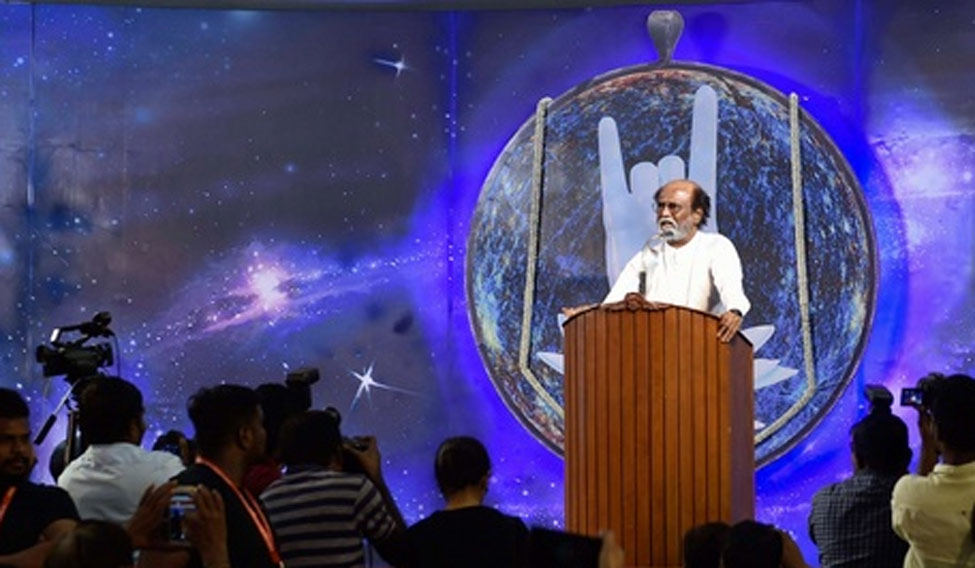Only two days into making a ‘suspended announcement’ of his launching a new party on New Year's Eve, politics seems to be already ‘humanising’ superstar Rajinikanth, who is otherwise known for having a ‘spiritual’ bent of mind in his personal life.
Though he had declared that he and his fans would not and should not talk politics until he was ready for launching the new party, purportedly ahead of contesting “all 234 Assembly seats” in Tamil Nadu on their own, he himself met mediapersons on Tuesday, recalling how he had met them the last time round in 1996 and had since only issued press statements, from time to time.
It was only a beginning, or so it seems. Reacting to unforgiving and unidentifiable social media criticism of his Baba hastha-mudra (hand-symbol)—borrowed from his Tamil movie of the same name and identified with his spiritual side ever since—Rajinikanth has since lost no time in modifying the new logo of his fans’ association.
The original symbol showed the mudra atop a lotus in a black background. As diverse critics on social media argued, the lotus is the poll symbol of the BJP while black in the state’s politico-sociological history goes for the Dravidar Kazhagam (DK) of late Periyar E.V. Ramaswami Naicker, with its anti-god, anti-Brahmin social stance.
The simple changes show that Rajinikanth is becoming sensitive to criticism, or is learning the political ropes, quick and fast.
Reports also have it that despite his asking his fans to wait silently until he was ready with the party—interpreted as near-eternity—they were finalising the name, symbol and standard for one, possibly with the ‘Baba mudra’ becoming a centre piece thereof.
There is no confirmation of the same, as a politically aware superstar may consider such suggestions from his core group, as the mudra is identified near exclusively with Hinduism. However his fan following now and prospective political base later on cannot afford to send out mixed, if not negative, signals to the minority communities in the existing and emerging Hindutva-centric political climate, not just in the state, but across the country, too.
Both in his announcement meeting on New Year's Eve, and his maiden news conference in decades two days later, Rajinikanth focussed more attention on the media, and appealed for their guidance and cooperation.
The last time he addressed a political news conference, there was no social media. He had said he was wary of the media, and how it would and could portray him.
Just a day after he announced his party's formation decision, some social media users dug out old newspaper clips from the late Seventies to show him in poor public light. These clips were from his stressful early life as a move star, when an up-and-coming young actor was shooting 24 x 7 for days and weeks, endlessly, leading to mental strain that resulted in avoidable situations.
In a way, Rajinikanth was believed to have turned to spirituality as a stress-buster, and succeeded in becoming spiritually 'superior' to most film personalities in town, barring possibly music composer Illayaraja, a superstar in his own right who has since made way for a newer genre of film music and newer generation of composers.
It now remains to be seen how Rajinikanth intends to balance his spiritual self with the demands and compulsions of day-to-day politics.
This is pertinent as AIADMK founder M.G. Ramachandran, the most charismatic actor and leader of his times, was known to be incorruptible even when in power, but was not seen anymore when Indira Gandhi, on return to power as prime minister, post the Janata experiment in 1980, sacked the state government and forced an unwanted round of Assembly elections when MGR was not prepared for it. However, MGR went on to win, all the same.
The writer is director, Chennai Chapter of the Observer Research Foundation, the multidisciplinary Indian public-policy think-tank, headquartered in New Delhi





